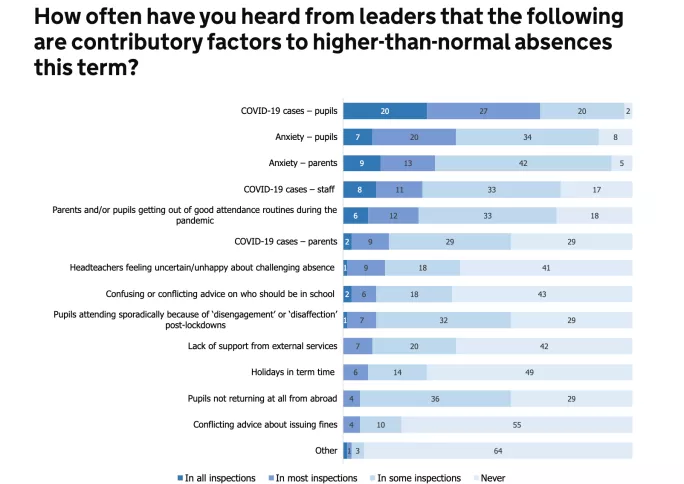Anxiety fuelling school absence, heads tell Ofsted

Covid cases and increased anxiety among pupils and parents are the main reasons why schools have seen higher than normal absence levels last term, headteachers have told Ofsted.
A survey of HMI inspectors found that Covid cases among pupils was the reason most commonly cited by school leaders for lower-than-normal attendance last autumn.
This was followed by anxiety among pupils and, thirdly, parents’ anxiety - both of which were highlighted by the vast majority of Ofsted inspectors surveyed.
The findings are published in a new report by Ofsted, which sets out how the watchdog thinks schools can best promote regular attendance.
It warns that pupils’ worries were not always related to school - sometimes they were linked to their wider experiences during the pandemic, including relatives becoming ill or fears that this could happen; or seeing parents under more stress than usual, experiencing domestic violence or experiencing financial difficulties.
- School absence: DfE wants new framework for issuing parents’ fines
- Zahawi: Education secretary launches ‘Attendance Alliance’
- Covid: Pupil absence jumps up by 100,000 in two weeks
The Ofsted report comes after education secretary Nadhim Zahawi announced a crackdown on what he described as a “postcode lottery” on school absence across the country.
Mr Zahawi is also leading a new Attendance Alliance of sector leaders, which is not looking at Covid-related school absence as part of its work.
However, today’s Ofsted data suggests that Covid absence and the knock-on effects of the pandemic are the main issues driving lower attendance figures.
What Ofsted says about school absence
Data from a survey of inspectors shows that close to one-third (29 per cent) of HMIs who took part had been told by schools that Covid cases in pupils were a factor in higher absences in all of the schools they had visited. The same proportion said Covid cases had been highlighted in some but not all of their inspections.
Another 39 per cent of HMIs said this was a factor in most of their inspections. Only two inspectors out of the 69 surveyed said it has not been a factor in any of the schools they had inspected.
New figures showing Covid levels among pupils are due to be published tomorrow but the most recent data shows that more than 320,000 pupils had the virus at the end of last month.

* In the above graph, the figures are the number of inspectors who gave a particular answer, rather than a percentage of the total number of inspectors surveyed
Anxiety among pupils - mentioned by 88 per cent inspectors - and among parents (92 per cent) were also among the main factors cited by schools to explain the drop in attendance, according to the survey.
Other drivers for pupil absence were Covid cases among staff and parents, parents and pupils getting out of good attendance routines during the pandemic, and heads feeling uncertain or unhappy about challenging absences.
The Department for Education has launched a new consultation on creating a national framework for when fines should be issued to parents for pupils not attending school.
However, Ofsted’s survey does not suggest that confusion over fines is a major factor driving higher absence rates.
In fact, the majority of inspectors (69 per cent) surveyed had not been told that conflicting advice about when to issue fines was a reason for lower-than-normal attendance in schools last term.
Ofsted’s new report - Securing Good Attendance And Tackling Persistent Absence - highlights several examples of how the Covid pandemic has indirectly led to lower attendance.
‘Bubble-isolation mentality’
It says that in some cases parents were keeping children home “unnecessarily” because of proximity to Covid - a relative or another child in a separate class testing positive, for example - and were finding it hard to move on from the “bubble-isolation mentality”.
The report says leaders also described situations where “possible Covid” appeared to be used as an excuse by some families whose children are “usually poor attenders”.
In these situations, leaders said that they would strongly encourage the family to either take the child for a test at a test centre promptly, or get one online if this is impossible.
It also says that some pupils feel they do not need to be in school because of the remote learning provided during national lockdowns.
Ofsted says that, in secondary schools in particular, “it appears that the provision of remote education during national lockdowns has negatively affected some pupils’ perceptions of the need to be in school”.
One school leader said they sensed that pupils felt “you weren’t fussed when we weren’t in school all that time in lockdown and we did our work at home, so why does it matter so much now?”
Some parents also expect that online learning will be provided for their children if they go on holiday during term time, Ofsted found.
The report adds: “One leader, for example, explained how the school had ‘sold’ to parents the benefits of learning using the Oak Academy [online] platform in order to get them to commit to this during the national lockdown. Parents saw the benefits of this and a few now think that this is enough for their children.”
Sometimes particular events in the local area made pupils more anxious, the report says.
One school leader reported that primary school pupils were “very upset” by “anti-vax” protests outside their school, and that a “great deal of work had to go into alleviating their concerns”.
Parents also kept their children off school following media reports of a rise in Covid-19 cases in their local area.
And the report adds that some poor attendance is caused by families who feel they have not had a holiday in a long time or take a previously cancelled holiday during term time, but it says that some schools reported fewer term-time holidays than usual.
You need a Tes subscription to read this article
Subscribe now to read this article and get other subscriber-only content:
- Unlimited access to all Tes magazine content
- Exclusive subscriber-only stories
- Award-winning email newsletters
Already a subscriber? Log in
You need a subscription to read this article
Subscribe now to read this article and get other subscriber-only content, including:
- Unlimited access to all Tes magazine content
- Exclusive subscriber-only stories
- Award-winning email newsletters
topics in this article



